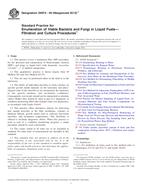We need your consent to use the individual data so that you can see information about your interests, among other things. Click "OK" to give your consent.
ASTM D6974-09(2013)e1
Standard Practice for Enumeration of Viable Bacteria and Fungi in Liquid Fuels—Filtration and Culture Procedures (Includes all amendments And changes 1/23/2015).
Automatically translated name:
Standard Practice for Enumeration of Viable Bacteria and Fungi in Liquid Fuels—Filtration and Culture Procedures
STANDARD published on 1.5.2013
The information about the standard:
Designation standards: ASTM D6974-09(2013)e1
Note: WITHDRAWN
Publication date standards: 1.5.2013
SKU: NS-37163
The number of pages: 5
Approximate weight : 15 g (0.03 lbs)
Country: American technical standard
Category: Technical standards ASTM
Annotation of standard text ASTM D6974-09(2013)e1 :
Keywords:
bacteria, biodegradation, biodeterioration, colony forming unit, enumeration, fuel microbiology, fungi, membrane filter technique, viable count, ICS Number Code 75.160.20 (Liquid fuels)
Additional information
| Significance and Use | ||||||||||||||||||||||
|
5.1 Biodeteriogenic microbes infecting fuel systems typically are most abundant within slime accumulations on system surfaces or at the fuel-water interface (Guide D6469). However, it is often impractical to obtain samples from these locations within fuel systems. Although the numbers of viable bacteria and fungi recovered from fuel-phase samples are likely to be several orders of magnitude smaller than those found in water-phase samples, fuel-phase organisms are often the most readily available indicators of fuel and fuel system microbial contamination. 5.2 Growth Medium Selectivity—Guide E1326 discusses the limitations of growth medium selection. Any medium selected will favor colony formation by some species and suppress colony formation by others. As noted in 5.3 Since a wide range of sample sizes, or dilutions thereof, can be analyzed by the membrane filter technique (Test Methods D5259 and F1094), the test sensitivity can be adjusted for the population density expected in the sample. 5.4 Enumeration data should be used as part of diagnostic efforts or routine condition monitoring programs. Enumeration data should not be used as fuel quality criteria. |
||||||||||||||||||||||
| 1. Scope | ||||||||||||||||||||||
|
1.1 This practice covers a membrane filter (MF) procedure for the detection and enumeration of Heterotrophic bacteria (HPC) and fungi in liquid fuels with kinematic viscosities ≤24 mm2 · s-1 at ambient temperature. 1.2 This quantitative practice is drawn largely from IP Method 385 and Test Method D5259. 1.3 This test may be performed either in the field or in the laboratory. 1.4 The ability of individual microbes to form colonies on specific growth media depends on the taxonomy and physiological state of the microbes to be enumerated, the chemistry of the growth medium, and incubation conditions. Consequently, test results should not be interpreted as absolute values. Rather they should be used as part of a diagnostic or condition monitoring effort that includes other test parameters, in accordance with Guide D6469. 1.5 This practice offers alternative options for delivering fuel sample microbes to the filter membrane, volumes or dilutions filtered, growth media used to cultivate fuel-borne microbes, and incubation temperatures. This flexibility is offered to facilitate diagnostic efforts. When this practice is used as part of a condition monitoring program, a single procedure should be used consistently. 1.6 The values stated in SI units are to be regarded as standard. No other units of measurement are included in this standard. 1.7 This standard does not purport to address all of the safety concerns, if any, associated with its use. It is the responsibility of the user of this standard to establish appropriate safety and health practices and determine the applicability of regulatory limitations prior to use. |
||||||||||||||||||||||
| 2. Referenced Documents | ||||||||||||||||||||||
|
We recommend:
Technical standards updating
Do you want to make sure you use only the valid technical standards?
We can offer you a solution which will provide you a monthly overview concerning the updating of standards which you use.
Would you like to know more? Look at this page.




 Cookies
Cookies
